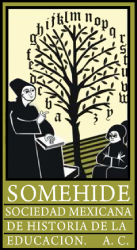Processes of integral formation in a Rural Normal School for girls. The construction of individual and collective identities
DOI:
https://doi.org/10.29351/amhe.v4i2.683Keywords:
Educational training, gender, identity, internship, rural normalismAbstract
The objective of this paper is to approach the integral formative processes through which the students of the Escuela Normal Rural of Cañada Honda, Aguascalientes, go through. The students are in a boarding school, so their daily life is radically transformed. Together we try to analyze what kind of relationship exists regarding their educational training and reflect on their individual identity, which transits and contributes, in common, to build a collective identity. Therefore, it becomes necessary to analyze the conflicts, affirmations and different processes that end up concluding in an identification as female normalista students. I analyze this process from the proposals made by Eduardo Restrepo (2012) and Peter Wade (2002), from which we identify several spheres to build identity processes that end up constituting their thinking and practice, which are: individual identity, the sexed, “engendered” and nationalized subject, which in this case refers to the national migratory issue. The historical process that concerns the rural normalistas is contemplated within a resistance that other political processes go through. In addition to this diachronic consideration, a specific pedagogical work is added, which together are of great relevance for their integral formation and the conformation of their identity as teacher educators. The study is the product of ethnographic and documentary research. The interviews and fieldwork were conducted between September-November 2018 and February 2019.
References
Civera Cerecedo, A. (2008). La escuela como opción de vida: la formación de maestros normalistas rurales en México, 1921-1945. El Colegio Mexiquense.
Coll, T. (2015). Las Normales Rurales: noventa años de lucha y resistencia. El Cotidiano, (189), 83-94. https://www.redalyc.org/articulo.oa?id=32533819012
Lagarde y de los Ríos, M. (2015). Los cautiverios de las mujeres. Madresposas, monjas, putas, presas y locas. Siglo XXI.
Ortiz Briano, S. (2012). Entre la nostalgia y la incertidumbre. Movimiento estudiantil en el normalismo rural mexicano. Universidad Autónoma de Zacatecas.
Restrepo, E. (2012). Intervenciones en teoría cultural. Universidad de Cauca. https://www.aacademica.org/eduardo.restrepo/6.pdf
Sotelo Inclán, J. (1982). La educación socialista. En F. Soldana, R. Cardiel Reyes y R. Bolaños Martínez (coords.), Historia de la educación pública en México (pp. 232-326). Fondo de Cultura Económica/SEP.
Wade, P. (2002). Identidad. En M. R. Serje de la Ossa, M. C. Suaza Vargas y R. Pineda Camacho (eds.), Palabras para desarmar (pp. 255-264). Ministerio de Cultura/Instituto Colombiano de Antropología e Historia.
Downloads
Published
How to Cite
Issue
Section
License
Copyright (c) 2025 Danae Marmolejo Sandoval

This work is licensed under a Creative Commons Attribution-NonCommercial 4.0 International License.
Todos los contenidos del Anuario Mexicano de Historia de la Educación se publican bajo una licencia Creative Commons Atribución No Comercial 4.0 Internacional (CC BY-NC 4.0), que permite compartir (copiar y redistribuir el material en cualquier medio o formato) y adaptar (remezclar, transformar y construir a partir del material) para fines no comerciales, dando los créditos a los autores y a la revista, tal como lo establece la licencia.
La política de acceso abierto y de licencias con “algunos derechos reservados” no niega la propiedad intelectual ni los derechos de los autores respecto a sus artículos, pues ellos son los titulares, en tanto que el Anuario Mexicano de Historia de la Educación no los reserva para sí ni para la institución editora, ya que se apegan a movimientos de acceso abierto como los Principios y Valores del Sistema de Información Científica Redalyc - Red de Revistas Científicas de América Latina y el Caribe, que pugnan por la eliminación de las políticas de embargo para que el autor retenga los derechos de su obra (principio número 8). Así como las políticas de acceso abierto del Directory of Open Access Journals (DOAJ).
Los autores podrán distribuir su propio material en cualquier otro medio o soporte, siempre y cuando sea para fines no comerciales, informando a los editores que el trabajo será publicado nuevamente y dando el crédito correspondiente al Anuario Mexicano de Historia de la Educación.
La publicación en el Anuario Mexicano de Historia de la Educación, por su carácter gratuito, no da derecho a remuneración económica alguna a los autores, ni a los dictaminadores.
Los lectores podrán reproducir (copiar), comunicar, distribuir o hacer obras derivadas de los artículos o colaboraciones publicados en el Anuario Mexicano de Historia de la Educación en los siguientes casos:
- Para fines públicos.
- Sin fines comerciales.
- Que se reconozca la autoría de la obra y se cite su origen con información completa: Apellido/s del autor, inicial/es del nombre/s. (año de publicación). Título del artículo. Nombre de la revista, volumen (número de ejemplar), página inicial del artículo-página final del artículo. DOI o URL (formato sugerido de acuerdo al estilo APA en su versión más reciente).
El cuerpo editorial del Anuario Mexicano de Historia de la Educación asumirá el compromiso de notificar oportunamente a los autores sobre cualquier cambio de ubicación de los artículos en el sitio (cambio de dirección URL o de conexiones para identificar el artículo).
Los autores, al enviar sus trabajos para su posible publicación, deberán tomar en cuenta los puntos anteriores, mismos que se contemplan en el Acuerdo entre autor y el Anuario Mexicano de Historia de la Educación.












